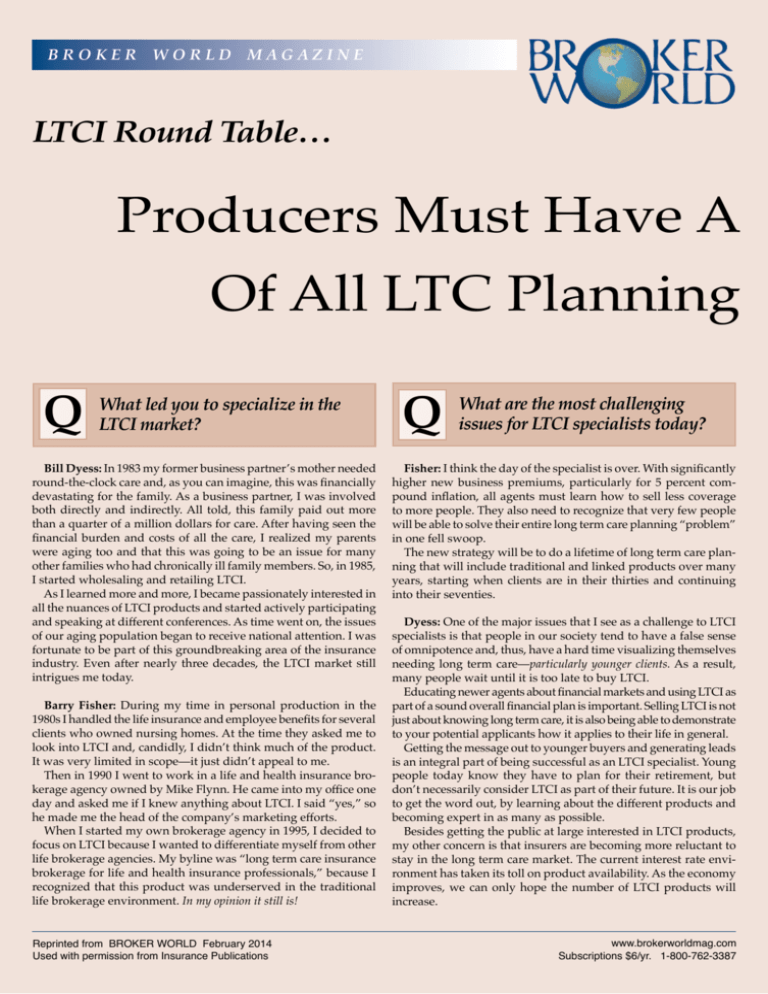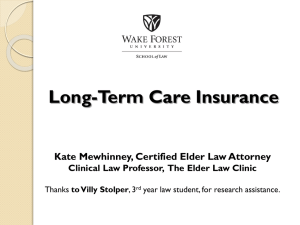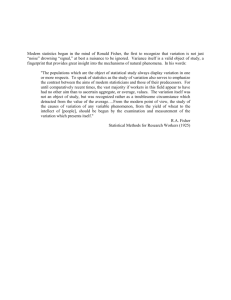Of All LTC Planning Solutions Producers Must Have A Broad-Ba
advertisement

BROKER WORLD MAGAZINE LTCI Round Table… The Producers Must Have A Of All LTC Planning Q What led you to specialize in the LTCI market? Bill Dyess: In 1983 my former business partner’s mother needed round-the-clock care and, as you can imagine, this was financially devastating for the family. As a business partner, I was involved both directly and indirectly. All told, this family paid out more than a quarter of a million dollars for care. After having seen the financial burden and costs of all the care, I realized my parents were aging too and that this was going to be an issue for many other families who had chronically ill family members. So, in 1985, I started wholesaling and retailing LTCI. As I learned more and more, I became passionately interested in all the nuances of LTCI products and started actively participating and speaking at different conferences. As time went on, the issues of our aging population began to receive national attention. I was fortunate to be part of this groundbreaking area of the insurance industry. Even after nearly three decades, the LTCI market still intrigues me today. Barry Fisher: During my time in personal production in the 1980s I handled the life insurance and employee benefits for several clients who owned nursing homes. At the time they asked me to look into LTCI and, candidly, I didn’t think much of the product. It was very limited in scope­—it just didn’t appeal to me. Then in 1990 I went to work in a life and health insurance brokerage agency owned by Mike Flynn. He came into my office one day and asked me if I knew anything about LTCI. I said “yes,” so he made me the head of the company’s marketing efforts. When I started my own brokerage agency in 1995, I decided to focus on LTCI because I wanted to differentiate myself from other life brokerage agencies. My byline was “long term care insurance brokerage for life and health insurance professionals,” because I recognized that this product was underserved in the traditional life brokerage environment. In my opinion it still is! Q What are the most challenging issues for LTCI specialists today? Fisher: I think the day of the specialist is over. With significantly higher new business premiums, particularly for 5 percent compound inflation, all agents must learn how to sell less coverage to more people. They also need to recognize that very few people will be able to solve their entire long term care planning “problem” in one fell swoop. The new strategy will be to do a lifetime of long term care planning that will include traditional and linked products over many years, starting when clients are in their thirties and continuing into their seventies. Dyess: One of the major issues that I see as a challenge to LTCI specialists is that people in our society tend to have a false sense of omnipotence and, thus, have a hard time visualizing themselves needing long term care­—particularly younger clients. As a result, many people wait until it is too late to buy LTCI. Educating newer agents about financial markets and using LTCI as part of a sound overall financial plan is important. Selling LTCI is not just about knowing long term care, it is also being able to demonstrate to your potential applicants how it applies to their life in general. Getting the message out to younger buyers and generating leads is an integral part of being successful as an LTCI specialist. Young people today know they have to plan for their retirement, but don’t necessarily consider LTCI as part of their future. It is our job to get the word out, by learning about the different products and becoming expert in as many as possible. Besides getting the public at large interested in LTCI products, my other concern is that insurers are becoming more reluctant to stay in the long term care market. The current interest rate environment has taken its toll on product availability. As the economy improves, we can only hope the number of LTCI products will increase. Reprinted from BROKER WORLD February 2014 Used with permission from Insurance Publications www.brokerworldmag.com Subscriptions $6/yr. 1-800-762-3387 BROKER WORLD MAGAZINE Broad-Based Knowledge Solutions Barry J. Fisher America’s Long-Term Care Insurance Experts, LLC William R. “Bill” Dyess Dyess Insurance Services Q When selling LTC insurance, a common challenge brokers face is a client’s “I can’t afford it” attitude. What is the best way to get beyond such objections? Dyess: Something I feel very strongly about is that the majority of people who want to buy LTCI are willing to apply for the coverage; however, the sticker shock often requires that you educate clients in order to reduce their anxiety about allocating the funds necessary for a potential health care need. Creating the value of a LTCI product is an essential part of overcoming objections to the sale. Understanding how valuable that policy will be if they need care goes a long way in reducing their hesitation. Comparing what they are going to pay for long term care to what they will actually pay for a policy is another way to educate clients about the value of LTCI. At the end of the day, educating your client that this is a liability nearly three out of four of us face also creates interest and fosters the reality of our personal needs. In our present economy, a lot of people think they can’t afford to buy LTCI, but getting them to believe they can’t afford not to is a more clear and concise objective. Fisher: Don’t oversell the need, and solve the problem incrementally with various planning solutions that may serve multiple purposes. Q What advice do you have for producers who are just entering the LTC insurance market? Fisher: They will not be able to be a one-trick pony. They’ll have to have a broad-based knowledge of all of the long term care planning solutions. They also need to work with a brokerage agency that can help them fulfill all of their various training and product needs. Dyess: Being successful in the LTCI marketplace requires more than just an in-depth knowledge of the products available. Having a multi-dimensional knowledge of financial markets and trends goes a long way in overcoming objections. You project an image of being more than just an insurance agent—you are a specialist in a very particular area of the market. Understanding and creating the value of a product can’t be emphasized enough. I always find that talking to a person directly about the numbers—what they have actually invested compared to Reprinted from BROKER WORLD February 2014 Used with permission from Insurance Publications www.brokerworldmag.com Subscriptions $6/yr. 1-800-762-3387 BROKER WORLD MAGAZINE the statistical return on their dollar at claim time—sparks an interest. When people begin to learn the risk that they are taking by not planning for their future, it can be a very sobering experience for them. Sometimes you just have to let a client digest what they are really planning for. Don’t be afraid if they initially walk away. It is a big decision. I think sometimes inexperienced producers feel they have to close the deal that minute, which I believe scares the client and is not the proper way to sell this product. Teaching clients that LTCI is something they invest in to give themselves peace of mind is something they will ultimately thank you for, rather than be resentful of. Q What advice would you give to producers who have been in the LTCI market for awhile? Dyess: I am constantly amazed at all of the new information out there, and I make it my business to acquire as much knowledge as I can about all the changes in products and legislation. I believe that we must continue educating our politicians so they can assist us by implementing legislation that will be favorable to our clients’ potential long term care needs, such as tax incentives for people who take responsibility and buy LTCI. We must continue to encourage employers to make LTCI available as part of their employee benefits plans, perhaps even making a small contribution. By using the power of their corporate size to buy down the price of LTCI, employers afford another benefit to their employees. In addition, buying it corporately significantly reduces the number of health care questions asked to get a policy issued. Educating employers about the tax benefits and potential deductions of premiums is a perfect way to start a conversation with an employer client. Using public forums such as local newspapers, writing blogs and social media are also other ways for long term producers to contribute and to help the public raise awareness about the devastating statistics of the financial consequences of not having LTCI. Q What LTC insurance product innovations should producers know about? Fisher: Real product innovation is just getting started. LTC insurance and long term care planning, as we know it, will be much different five years from now. Carriers are developing product strategies that will cause the insured to share in more of the risk. With this in mind, sell the heck out of what we have now, because the products are not likely to get any better or less expensive. [BJF] Dyess: There has been some commentary from actuaries around the country indicating that more insurers are looking to get out of the market or, at a minimum, modify benefits. I think that there could be more carriers looking to find a way to limit benefits to the client and compensation to the agent to stay in the market or offer more affordable options for LTCI. One interesting product model suggested by Robert Yee in his 2012 article, “De-Constructing LTC,” is for LTCI products to adopt a universal life insurance product model. This suggests a movement toward a universal life/LTCI product norm as opposed to our current reimbursement or cash models. Linked or “hybrid” products have been around for quite some time, but have been used more prevalently over the last five years. Products of the future that may be entertained by insurance carriers may include a return of a portion of unused premiums to entice more consumers to purchase this product. Other areas of creative financ- Reprinted from BROKER WORLD February 2014 Used with permission from Insurance Publications ing is the reverse mortgage or the use of IRA/401(k)/qualified money, on the government side, to fund the cost of long term care. There is a growing awareness in our country that the government simply cannot afford to take care of our aging and chronically ill over long periods of time­—nor can they completely ignore it. Some of these innovations would incentivize consumers to protect themselves using tax-free vehicles and help financial advisors see it as a long term vision for their clients, ultimately making a specialty in LTCI a lucrative proposition for those who know their stuff. [WRD] William R. (Bill) Dyess, CLTC, has been a licensed insurance professional for 35 years and is president of Dyess Insurance Services. He started his education in Franklin, MA, at Dean College and is a University of Miami graduate as well as a former Miami Hurricane football player. Dyess has served as president of the Health Underwriters Association in Miami and Ft. Lauderdale and was also the recipient of their highest honor, the Stanley Greenspan Memorial Award. Presently, he serves as a board member of the Greater Ft. Lauderdale Financial Planning Association and is the director at large for the Florida State Financial Planning Association. He also served for 17 years as vice president of the executive committee board for the National LTC Network. He is a nationally recognized speaker on long term care, life insurance and annuities as well as a continuing education provider for industry professionals. Dyess can be reached at Dyess Insurance Services, 8201 Peters Road, Suite 1000, Plantation, FL 33324. Telephone: 954-916-2626. Email: bill@ dyessinsurance.com. Barry J. Fisher, LTCP, is founder of Barry J. Fisher Insurance Marketing, a pioneering long term care insurance brokerage agency. He now serves as executive vice president of Borden Hamman Agency’s long term care insurance division and is also the executive vice president of America’s Long-Term Care Insurance Experts, a national LTCI marketing group. Fisher can be reached at America’s Long-Term Care Insurance Experts, 7343 El Camino Real, PMB 356, Atascadero, CA 93422. Telephone: 818-444-7730. Email: barry@barryjfisher.com. www.brokerworldmag.com Subscriptions $6/yr. 1-800-762-3387











